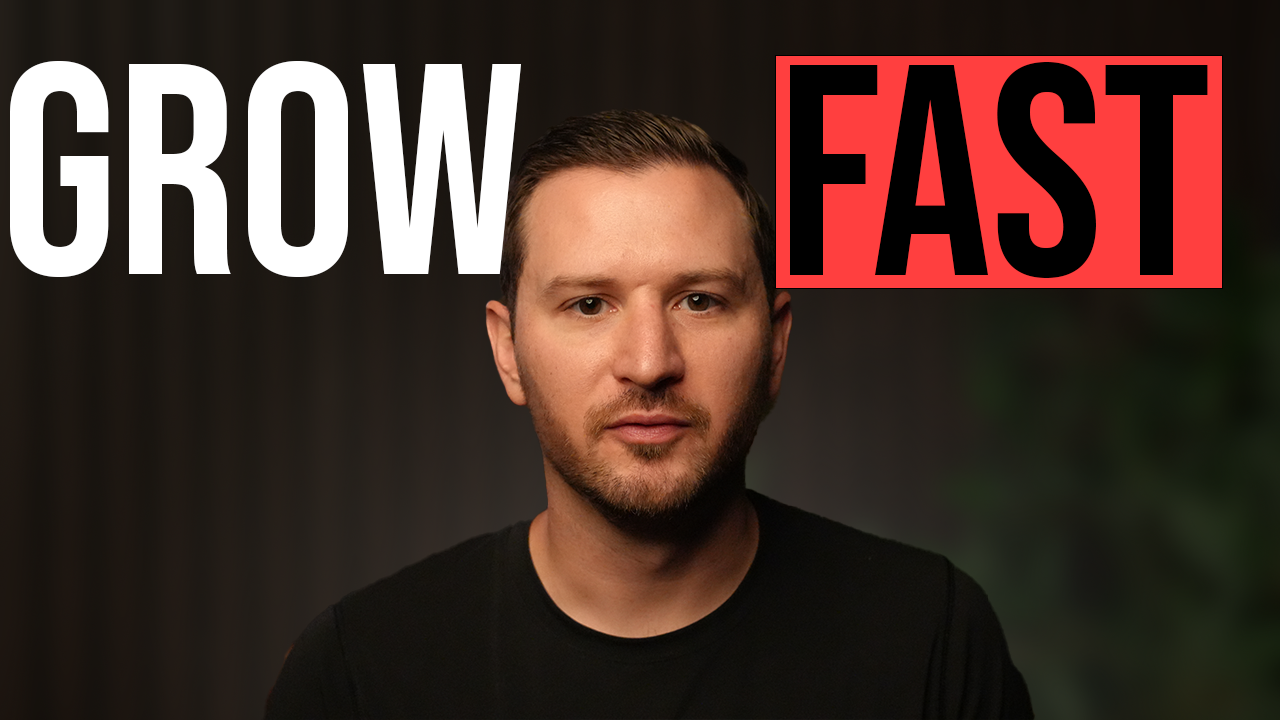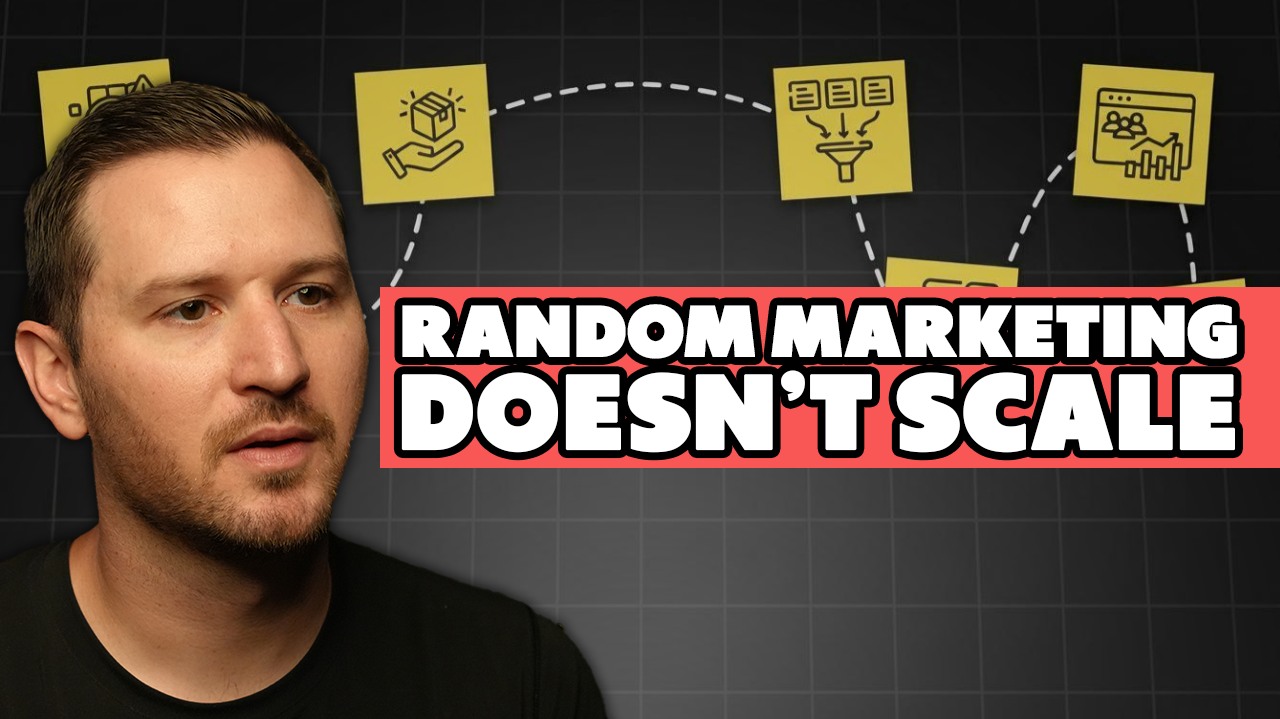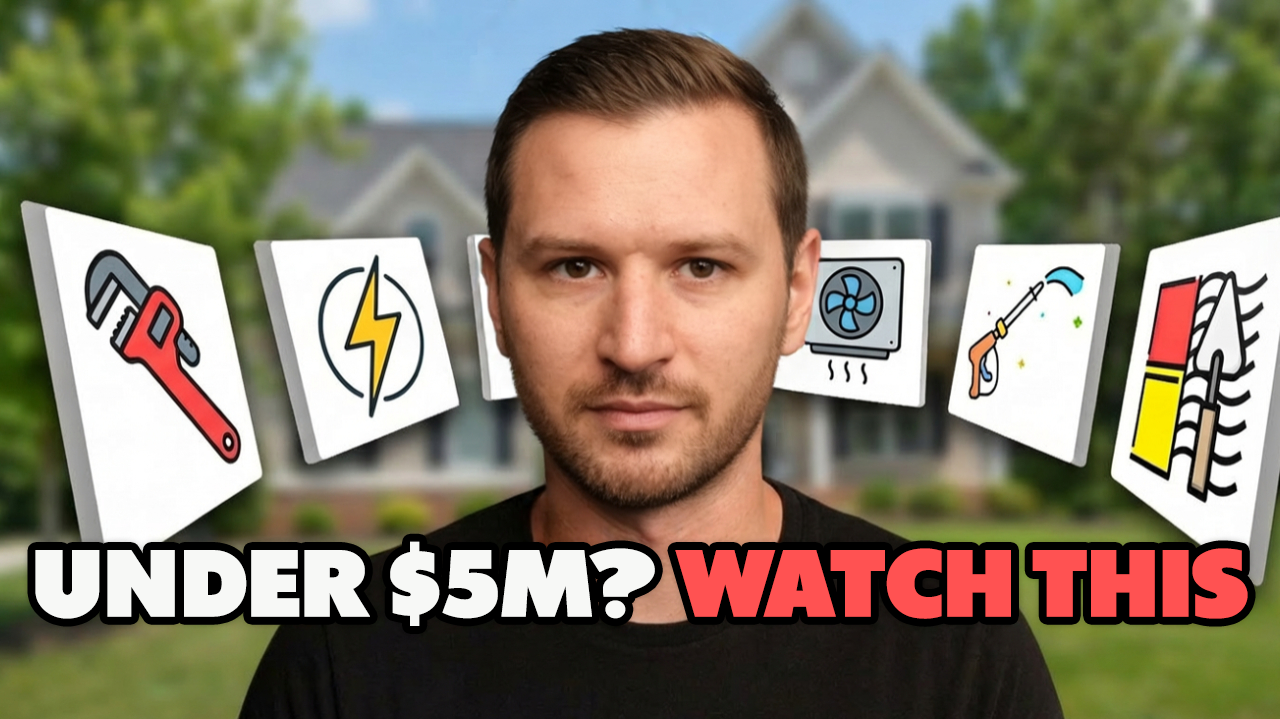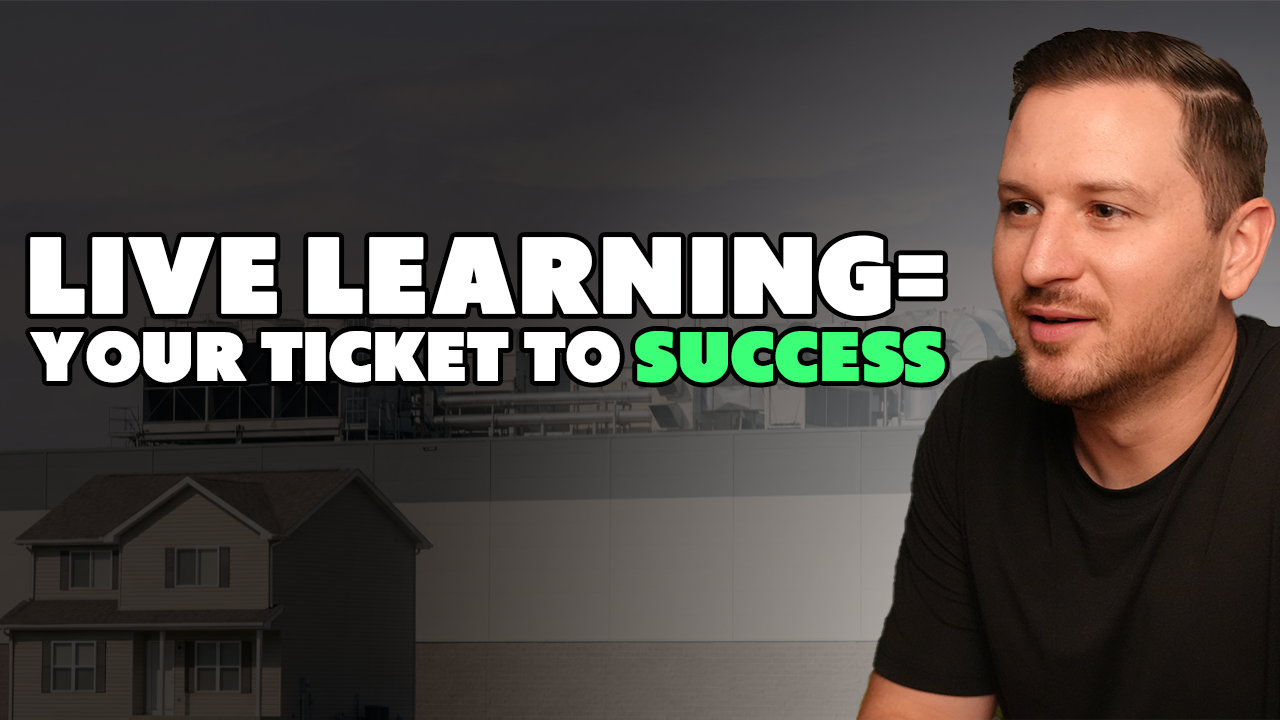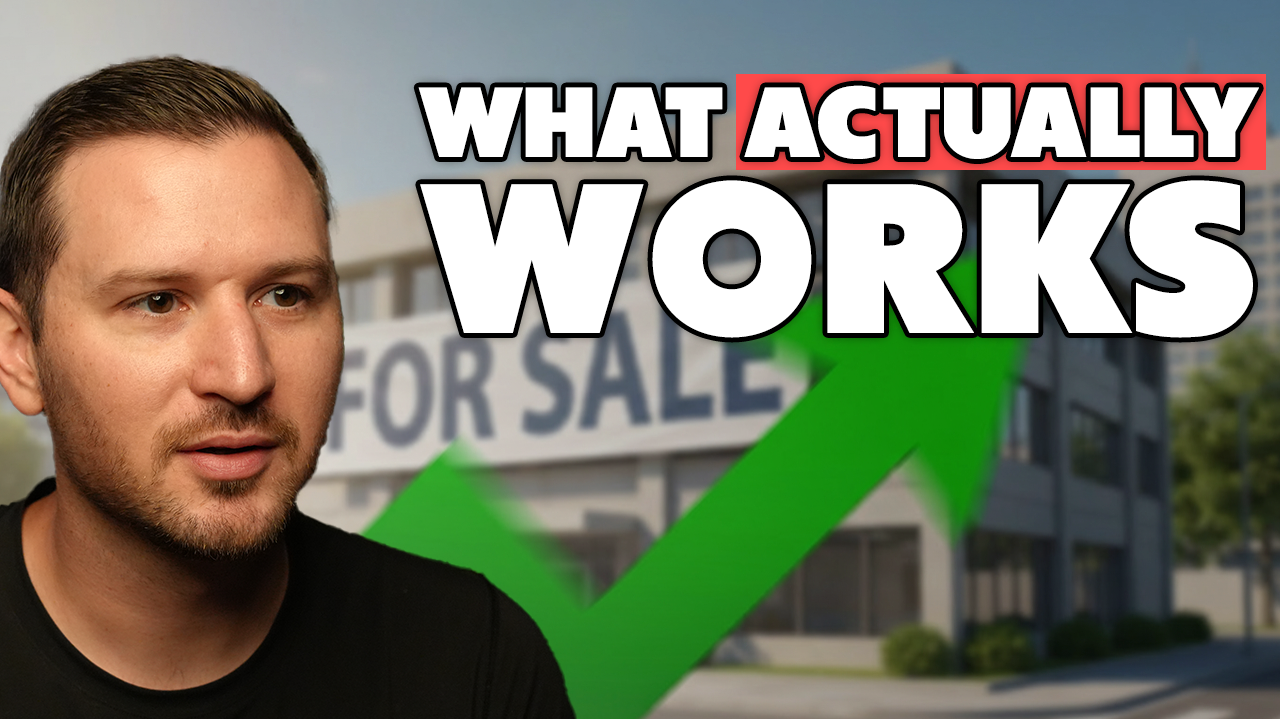In this episode of Owned and Operated, John Wilson sits down with Jack Carr from Jack Acquisitions, who also runs Rapid Response Plumbing, Heating & Cooling in Nashville, TN. Together, they break down the four most important pillars to scaling a home service company past $10 million a year: leads, people, sales, and infrastructure.
John and Jack dig into what separates $1M businesses from $10M+ operators, from locked-in marketing strategies to strong recruiting pipelines and dedicated sales teams. They highlight why incentives drive performance, how to attract money-hungry talent in today’s labor market, and why infrastructure supports growth but doesn’t replace the fundamentals.
Jack shares practical insights from his own company and acquisition experience—covering recruiting structures, incentive plans, sales processes, and the mindset shift it takes to scale. From driving consistent demand to building a rock-solid backbone for growth, this episode is packed with actionable strategies for contractors ready to break through the $10M ceiling.
💼 Extra Special Thanks to Service Scalers!
We’ve been partnering with Service Scalers to maximize our Local Service Ads (LSAs) and optimize our Google My Business profiles, and the results have been incredible. With hundreds of thousands in sales and 900+ calls in a single week, GMBs are now our top-performing organic lead channel.
Want to learn how Service Scalers can do the same for you?
Shout Out to FieldPulse 🚀
FieldPulse is an incredible Field Service Management platform that helps you save hours each week while keeping your operations running smoothly. If you're looking to streamline your processes, stay competitive, and focus on what truly matters, FieldPulse is a game-changer!
🎙️ Host:
John Wilson → https://x.com/wilsoncompanies
🎙️ Guest:
Jack Carr → https://x.com/thehvacjack
More Ways To Connect with O&O
John Wilson, CEO of Wilson Companies
Jack Carr, CEO of Rapid HVAC
📌 Disclaimer: Some links may include UTM parameters or affiliate relationships, meaning we may earn a commission if you make a purchase. Episodes may feature sponsors, but all opinions expressed are our own.
OAO Episode 239 Transcript
John Wilson: [00:00:00] The best thing you can do is incentivize people to grow your business for you.
Jack Carr: Yeah. Everybody's moving in the same direction. The hardest part right of that is getting people who are all money incentivized. Big portion of this is having a really strong recruiting structure.
John Wilson: Yeah. That's the big thing that sets apart that $10 million business from like a $1 million business.
You can't build. A house on a weak foundation.
Jack Carr: Yeah, exactly. Bringing on a salesperson drives sales because that's their only focus. That's gonna be the backbone to everything. You can't drive any demand. Yeah. You're not gonna sell anything.
John Wilson: Well, how do you expect to grow? How? How do you expect to add revenue?
Someone has to sell.
Welcome back to owned and operated. I'm your host, John Wilson. I'm building a $30 million home service company in Ohio, and here on the show I have Jack Carr from Jack Acquisitions and he runs Rapid Response Plumbing, heating and Cooling in Nashville, Tennessee. Today we're talking about how to build a service company above $10 million a year.
Make sure you like and sub, we're gonna be talking today about the four most [00:01:00] important things along that journey.
Jack Carr: Yeah, I mean, I think the obvious one to start is leads. Right. Yeah. You need demand, demand generation from somewhere. Um, and what I've kind of learned over the last few years is that is one of the biggest levers that you can pull is how do I drive demand as an owner?
Yeah. And how do I just scale that up as quick as possible? Because that's gonna be the backbone to everything. If you can't drive any demand, yeah. You're not gonna sell anything.
John Wilson: If you've been listening to the show for a while, you know that we've been big fans of service scalers. One of the things that they just dropped that we are really excited about is a paper lead program.
So what they help you do is they help you directly gain access to leads and scale up your lead partner program. Go to service scalers.com and say, we sent you. Yeah, yeah. I totally agree. It, it, it all starts with the lead. So, um, like we talk about it internally, but. It doesn't matter what my [00:02:00] booking rate is.
It doesn't matter what my average ticket is. It doesn't matter how good my salespeople are. It doesn't matter how nice my trucks are, like literally nothing matters. If we don't have leads, like that is the first thing that ever matters. Uh, so I, I think being locked in on it from the beginning, uh, makes a ton of sense and having a philosophy around it and, and I think what really sets the difference, you know, if I'm thinking about building this $10 million company versus building a $1 million company, like the $1 million company is sort of spread.
They're trying to figure out what works. If you got to 10 million, you have an idea of what works. Yeah, I was actually, you know how you're driving leads, you know the successful like one to two channels, like you only need one to two channels. Maybe a third to push hard to 10.
Jack Carr: Yeah. And to take it back even a step further, right.
As someone who comes from the acquisition side. Yeah. Like making sure you're actually choosing a business that has the ability to grow to 10.
John Wilson: Oh yeah. So yeah. Like are you buying a remote cleaning company that's not gonna be a 10 million
Jack Carr: business? Yeah, [00:03:00] it can Is just a different model where you're use utilizing like multiple locations.
Yeah. If you're doing a dog poop. Cleanup franchise. You're not gonna get a one location, $10 million business or it's going to be very, very difficult. Yeah.
John Wilson: Like the it, you could probably do it, but it's not worth it.
Jack Carr: Yeah.
John Wilson: Like I remember I did this, uh, program like 10 years ago. It was 10,000 small businesses through, um, Goldman Sachs, I think, and there was someone in there and he was like a $2 million, one and a half million dollar cleaning company, commercial cleaning.
He had a hundred in team members. Yeah. 100. For a million dollars. Yep. Which, like, that is not like, obviously everyone's part-time, no one's full-time. Maybe a couple hours here, a couple hours there. Managing a hundred people for only a million dollars. Sounds like my, my personal version of hell.
Jack Carr: But somebody has to do it.
I don't know that they do. Like somebody has to do it. There's going to be a large cleaning company at some [00:04:00] place, at some time, brain. So I'm not, I'm not discouraging people from doing it. No, no. If that's your thing and, and I'm not either. Just realizing it is harder and it's playing on hard mode's. Good.
Yeah. Playing on playing hard mode.
John Wilson: Yeah. It's playing because like to contrast it, and this is just like choose the game. Choose your game, choose the game. Like anything is hard. Choose your game in hvac, you can hit a million with three people. So if, if I'm
Jack Carr: not even, yeah. Maybe two, like Yeah. I've seen a husband and wife with a subcontractor do installs.
Hit, yeah. A million dollars, $1.2 million in our area.
John Wilson: Yeah.
Jack Carr: Which is wild.
John Wilson: Totally. So I, I think just like, yeah, not dogging on cleaning, just. Pick the game.
Jack Carr: I mean, I'm okay with you dogging on cleaning. Yeah. I'm just saying that somebody does have to do it. Someone does that and there there's a reason.
There's like $10 million, you know, there, there's $10 million, uh, commercial cleaning companies out there that have tons of contracts. Mm-hmm. Um, it's possible serv pro ServPro. No, they're like, ditch, serve, clean. Yeah, maybe something like that. There's a franchise out there. I've, I've talked to a few of them.
John Wilson: Alright, so at $10 million, we've got a locked in marketing budget. We have a [00:05:00] locked in marketing strategy. We know how we're filling the board every day. It's not a guess. We're walking in with a plan every day. Our team is thinking about it. We probably have a marketing coordinator who's helping manage the agencies that we use.
We're focusing a lot on reviews. We're using something like Big Reputation. We're responding, we're getting photos. Uh, so I think that's the big thing that sets apart that $10 million business from like a $1 million business. We have a plan. We're executing it. We're, we're locked in focus. We know how we're gonna fill the board every day.
Yeah, we're at 1 million. We don't know how we're gonna fill. It's a, mm-hmm. Who knows how we're gonna get leads today at 10 million? You know how you're gonna fill the board?
Jack Carr: A hundred percent. Yeah. Second one I would say is people, right now you have the leads. Somebody has to go run them. Somebody has to sell whatever product you have, and they have to do a good job at it.
Yeah. So understanding that. As you move and grow and scale. Mm-hmm. That, that is going to be probably one of the biggest bottlenecks is finding, especially in today's labor market, where everybody is going into tech and is going [00:06:00] into easy businesses. Yeah. In the home service field, finding those a hundred people to clean those Yeah.
Outta 10 million, a thousand people to clean houses or the 30 or 40 technicians you're gonna need to get there is a very difficult task because you have to find them, get them on, train them, and then keep them all the way through. Yeah.
John Wilson: I agree. Uh, so yeah, $10 million. What we're gonna, what we're focused on is we've got a good benefits package.
Mm-hmm. We have clearly laid out compensation plans. We have people that know how they can win inside the business. So there's probably an incentive structure. People are on flat rate. There's commission, there's bonuses, there's something, you know, one, one of the first things I did when I bought the business almost nine years ago was we in, put in an incentive plan.
It sounds so basic and, uh, like I'm still astonished when I hear people not doing this basic thing. Yeah. Like the, the best thing you can do is incentivize people to grow your business for you. Like, that's literally it. [00:07:00] Commissions. Yeah. Commissions. Like, Hey, if, if a technician is doing a great job, he should be rewarded for doing a great job.
Oh. Yeah, so if he's installing a ton of stuff, if he's selling a ton of stuff, like if someone over the phone is selling a bunch of memberships and like if someone's helping you build your business, they should be compensated for that. And that's when this starts to snowball because you have, you know, you go from like 10 people at a million dollars or you know, a couple million bucks or whatever, and you start installing incentive plans.
You start installing commissions and these, now people are more driven. You bring on people that are, I. Excited about commissions during your hiring and they, they literally start growing the business for you because they want to personally grow.
Jack Carr: Yeah. Everybody's moving in the same direction. The hardest part right of that is getting people who are all money incentivized.
Yes. Because in today's day of age, there's people who optimize for work-life balance or they're optimizing for this or that. I found, um. Optimizing for people who are really driven by monetary. Yeah. You need monetary money. Hungry people need money. Hungry people type A personalities that just want to compete and win.
Yeah. [00:08:00] Which has has been great. And I think a big portion of this, even though it's not, you know, we'll talk about this later, but a big portion of this is having a really strong recruiting structure. Yeah. Um, a recruiter really early on will Absolutely, yeah. Help you find those people. Yeah. Uh, so that it doesn't fall on your back.
'cause it takes a lot of time to get those people into your business. Yeah. And then making sure. You do an amazing job of it. Um, more so than we do. So, I mean, you could probably talk more about it, but, um, the actual like recruitment process of bringing them in.
John Wilson: Yeah. It's, and flipping the script, it's a sales process.
It's the same as marketing. Like how are we showing up on the internet? Yeah. Is our consultation good? Do we have good benefits when they come in? Are they treated like a rockstar? Do we shove 'em in a closet until somebody can take the time to interview 'em? Like how do we think about the recruiting process?
And at 10 million, you're probably more locked in, mainly because you're just doing it more at 10 million, you're probably hiring one person a month at 1 million. You're probably hiring one person a year. So you just have to get more locked as you know, that's 12 people a year. You're gonna have more of a process.[00:09:00]
Jack Carr: Yeah, exactly. And that's the process as you're going. 1, 2, 3, 4 million that you're building through. Uh, what I, what I kinda like about it is that it almost flips the script. I think a lot of smaller operators are begging really good texts to come to them. Mm-hmm. Whereas you set up a. A kind of atmosphere where it makes the tech actually want to work for you.
Mm-hmm. You're offering them good incentives, so they want to make money. Mm-hmm. You're showing them that this is a cool place to work. You're, uh, walking through your building, you're showing how happy everybody is. Yeah. Like you're treating them really well so that they want to work there. They don't, it's not you needing to go find someone and pulling them in.
John Wilson: Yeah.
Jack Carr: It's a. You're building demand versus forcing the demand.
John Wilson: Yeah. No, totally agree.
Jack Carr: Sweet.
John Wilson: Next up sales.
Jack Carr: Sales is a big one.
John Wilson: Yeah. Well, at 10 million, uh, I mean, really, this probably starts earlier, probably in like the, you know, 3, 4, 5 range. Like you're bringing on sales people. Mm-hmm. And their full-time job is to sell.
And, uh, that's a big move for a lot of [00:10:00] businesses. I know it was a big move for your, like, took off.
Jack Carr: Huge. For, for us it's been huge. A salesperson was our third hire. 'cause salespeople?
John Wilson: Yes. In
Jack Carr: general. And, and we're they moved the business, they like that's their job. Yeah. Literally. Yeah. It sounds silly to say it so simply, but it really is That simple is like, yeah, you bring in a salesperson, their goal is to sell.
Yes. You drive revenue. And if they don't, they don't stay there. They don't take anything from the business. 'cause they're usually commission based. Yeah. Bringing on a sales person drives sales. 'cause that's their only focus.
John Wilson: Yeah.
Jack Carr: But also, um,
John Wilson: I think and not like, you basically don't get to 10 if you're not, it's like sales.
It's marketing, then sales. Mm-hmm. Right? Like you need the lead. You need to sell the lead. So sales is this hyper important thing that I think when smaller contractors,
Jack Carr: they're like, oh, we don't wanna sell. I was just gonna get there. We heard that three times. We did the workshop this week, guys, if you, if you're just listening, and I heard that three or four times, it's like, I don't really wanna be that pushy sales person.
I don't wanna, I don't wanna be the sales guy who's in there. Well, how do you expect to grow?
John Wilson: How, how do you expect to add [00:11:00] revenue? And I'm not saying someone
Jack Carr: has to sell pushy. Yeah. But what I am saying is that. The, the goal of a business is to generate revenue.
John Wilson: Yeah.
Jack Carr: Like that is the goal of a business to, that's what we're here to do.
John Wilson: Fix, well place to generate profit, but it starts with generating revenue.
Jack Carr: Yes. A sales person's job is to generate revenue. The business's job is to generate the profit on the backend. Yeah. To design the profit. Yeah. Um, but point is, is you, you can't be a business without generating revenue, otherwise you shut down.
Like you have to have that revenue to be able to even start. Yeah. So I
John Wilson: think with sales, it's building a process. It's building some training. Mm-hmm. Like Nexstar has been a great partner for us. So they have a, like, Hey, here's your, here's the greet step, here's the explorer step. Like they have the six steps to like walk in and, you know, convert to a sale.
Mm-hmm. Um, there's other programs out there, but you, whatever program you're using. Just use a program, I think is, is sort of like my mindset on this. Like it, there's a million different ways to sell. You can find a bunch of 'em, just make sure you use one of those million. [00:12:00] Yeah. Have a process, have it locked in.
Work on, you know, how, how are we offering options? How are we talking about financing, how are we exploring the home and asking open-ended questions. The sales process is, is like w. Basically that's, that's five to 10. Like hiring that sales.
Jack Carr: That was that, that was two to five for us. Yeah. Like that. Getting good salespeople.
Our sales, uh, ca is gonna do 3 million this year. Yeah. Like, and then there is a sales portion where the technicians are selling the flip. Mm-hmm. Right. So like, there is more to it, but one good salesperson really can drive the business, multiple millions and help you grow, you know, different levels. Yeah.
So, um. But I fully agree 'cause we're bringing on a second one next year. So yeah.
John Wilson: Awesome. Field Pulse is the all-in-one field management solution for growing home service companies. Field Pulse is designed to simplify your day-to-day operations by combining everything you need into one platform. It also includes integrations to help you save time.
Like QuickBooks Desktop [00:13:00] and online. It has a bunch of advanced tools and features like A CRM estimates and invoicing. Good, better, best options, maintenance plans, a robust price book and scheduling dispatching Field Pulse will transform the way that you manage your field team. Altogether, it will save you time and find revenue that you didn't even know existed.
Whether you're a small company that's looking to grow, or a larger company looking to optimize Field Pulse, have the tools that you need to do it. And don't just take our word for it. Field Pulse has earned over 580 glow reviews with an average rating of 4.8 stars. That's field. E-U-L-S-E head to their website to learn more.
Field pulse.com. Our last one is infrastructure. You can't build a house on a weak foundation.
Jack Carr: Mm-hmm. And and more so than infrastructure. I think it's just supporting functions. Yeah. Like those three things need to be supported. They need to be supported by payroll. Yeah. Good payroll. Good hr, uh, you need software stack.
You have processes and software stack.
John Wilson: Yeah.
Jack Carr: Fleet Stack. Um, understanding just all of the [00:14:00] things that surround. Supporting those three. But like at its most condensed framework, that's what a home service business is. It's problem drives lead.
John Wilson: Mm-hmm.
Jack Carr: Lead goes to, uh, somebody who's gonna run the call technician.
Technician is the salesperson, or goes to another salesperson mm-hmm. Who sells. And then you need to support all of those functions with. Everything else. Yeah. That goes into it. And I think a lot of times what, what people get stuck on, especially in the like the one to 3 million range
John Wilson: Yeah.
Jack Carr: Is they really get stuck on, I need to focus on my infrastructure, I need to focus on my processes.
And I think it's important. You need to sell. It's important. Yeah. But at the same time, like you need to realize that the first, the first two. Are just as important as the fourth pillar. Mm-hmm. Like build those processes, but also get those leads, get those people, make those sales. Yeah. So that you can afford all that infrastructure.
John Wilson: Yeah. I've, I've said this a lot on the podcast over the years, but I, I remember, uh, like I have friends who are just way more organized than I am. Mm-hmm. [00:15:00] And like better, uh. They just run like very clean process. Like it's very locked in. It's, you know, you know where everything is. And my business is like a hundred times their size.
I don't even think I'm exaggerating and it, it, it's the first things first. Like I am bad at a lot of things, but I did put first things first. Yeah. Which is the lead. Then the sale, then the people, then the infrastructure supported. And like if the first couple break, like infrastructure doesn't matter.
Like it doesn't matter.
Jack Carr: And I, you could make it say it all the time. You can run the best warehouse in the country for an HVAC in plumbing, the most
John Wilson: organized I could eat. You know, I could all eat my lunch off the floor. Yeah. And my business won't grow a fucking inch.
Jack Carr: You, you've never lost a single piece of inventory in your life.
Everything is priced perfectly. Yeah. It just sits there because nobody's selling. You don't have
John Wilson: anything 'cause No. Yeah. I'm not getting the leads, I don't have the talent. Yeah. They're not trained how to [00:16:00] sell. Yeah. It's, I, I, you gotta put first things first and it's, I think it's easy to get sort of this like, you know, heads down I gotta fix and tweak and all that stuff.
But like, you got, you know, it's important. Like you can't, well you can't build a house on a weak foundation, but you can build while you're building. You, you can like build infrastructure and correct as you're going. And you also don't need to overinvest that far. Like we're 30 million this year. I'm not super concerned about having the right tech stack for when I'm a hundred.
Like I can figure that out at 80 to 90 between, right, right. Now in the next couple years I'm aiming for how, what's the next 24 months look like and how do we make sure that I'm set up for that success? Am I set up at 30 to get to 40, 40 to get to 50 and so on.
Jack Carr: Yeah, no, that makes total sense. Um, I mean, that's where we're at.
So we're at five, we are set up to hit 10, and that is the goal of next year. Mm-hmm. And so. All of our infrastructure's in place and I think you'd be [00:17:00] surprised when you're looking at us versus other companies that are in the two to 3 million range. Mm-hmm. They have big old buildings and they have all these offices and you walk into ours and it's like, it's really bare bones.
Mm-hmm. Like just because we are very, very efficient with how we do things and we understand that it's leads, people, sales, infrastructure.
John Wilson: Yeah.
Jack Carr: If
John Wilson: you like what you heard, make sure you like and
Jack Carr: sub, if you didn't like what you heard, make sure still like and sub.

